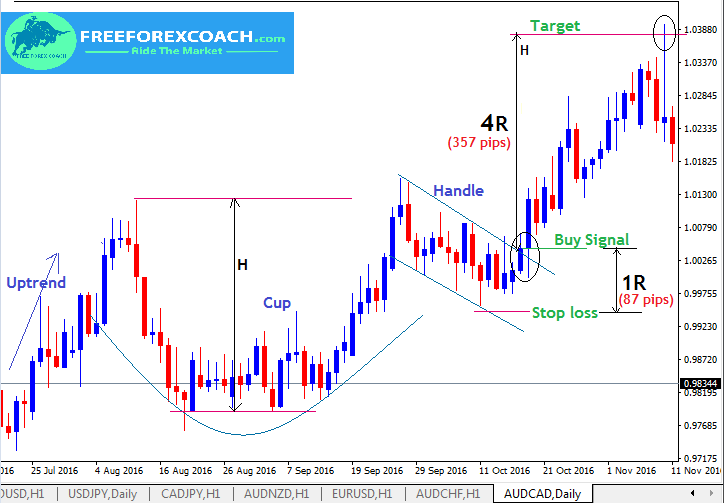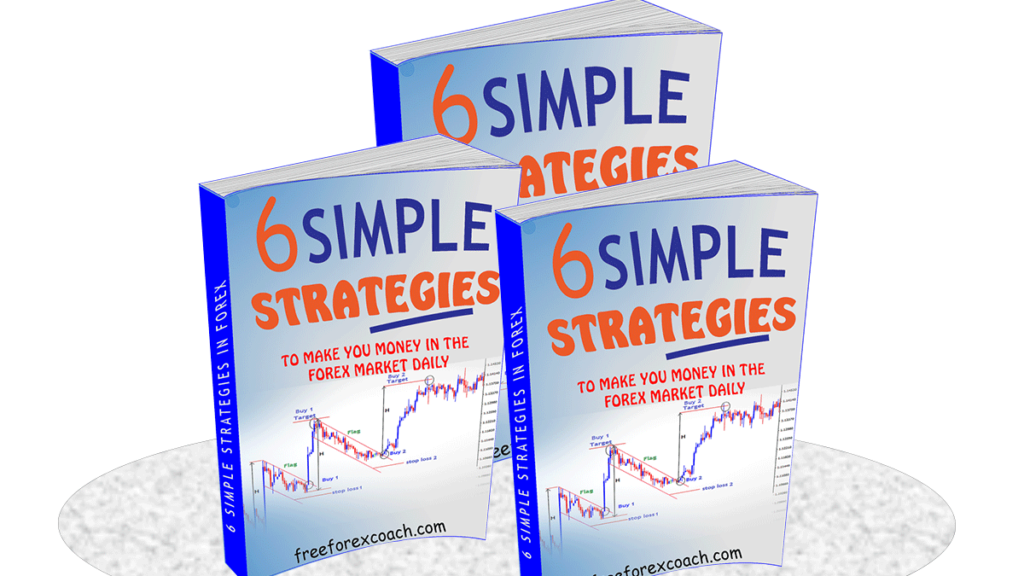A good Risk reward ratio in Forex will profit you even when you undergo several losses. You should be able to make money over a series of trades even if you lose majority of them.
As we learnt in the previous lesson,
The reward to risk ratio of a trade, is simply the ratio between your estimated profit and its potential loss.
Alternatively, you can use stop loss (SL) pips divide it by take profit(TP) pips.
Look at the trade below on the AUD/CAD daily chart below with a cup and handle pattern

From the above example;
Stop loss pips = 87 pips, Take profit pips = 357 pips
Therefore, Risk reward ratio = 87/ 357 = 1/4 ie 1:4
Above all, you must always take trades that at least have a Risk Reward ratio of at least 1:2.
A good risk reward will profit you even when you undergo several losses. You should be able to make money over a series of trades even if you lose majority of them.
What is a good risk-reward ratio (rr Ratio)
A good risk reward ration in forex means that you don’t have to be right all the time to make money trading.
Example on good RR ratio,
If you take 10 trades, all having a Risk Reward Ratio of 1:3. Assume your winning rate is 50% or above.
On 10 trades, at 50%winning rate, you win 5 trades and lose 5 trades. If you are risking $10 per trade;
You lose; $10 on each trade and make (3*10) $30
Loss for 5 trades (5 * 10)=$50
Winning trades (5 * 30) =$150, Profit =$ (150 – 50), $100
You still stay in profit even after 5 losing trades.
How about when you use risk reward of 1:1?
From the above example, if you use the ratio of 1:1, risking $10 on a 50% winning strategy;
Loss for 5 trades =$(1*10*5), $50
Winning trades =$(1*10*5), $50.
After using a ratio of 1:1, risk reward, you can still break-even after 5 losing trades.
With a 1:1 risk reward ratio, you may neither make losses nor profits if your winning rate is 50% and above, when you incorporate in losses.
A good risk reward ratio in forex for a profitable strategy is one whose reward is greater than one.
What you should consider for a good rr ratio
1. Spreads
First, you need to consider the spread charged by your Forex broker to conduct the risk and reward analysis effectively.
If you do not pay attention to the spread, you will end up using a risk to reward ratio for your trades that is not completely accurate.
Currency pairs with larger spreads require larger stops than pairs with tight stops.
For example,
If you are a scalper who likes to risk a maximum of 3 pips per trade and target 9 pips from each of your trades, Your risk reward ratio is 1:3.
If your broker charges 3 pips spread on your trade, then your risk increases to (3 + 3 =6 pips).
Your target (9 – 3 =) 6 pips of profit. This means your real risk to reward ratio is 1: 1 not 1:3 which is not correct because you did not account for the spread.
This is very common especially when you are trading currency cross pairs. The have big spreads unlike the major currency pairs.
For a swing trader or position trader, spread may not be such an issue.
2. Price Volatility.
When setting your risk to reward ratio, you must look at the current market price volatility. Or else you will be stopped without notice.
You should set larger stops when trading in high market volatility to allow price adjustments hence large risk.
However for low volatile markets, you can use a small stops but not very tight.
3. Long term Vs Short term Trading
With position trading/ long term, traders hold positions for months to years.
To do that, you need a large stop loss to allow price fluctuation adjustments hence large risk.
Conversely, since the day traders hold positions for a short time, minutes to hours, they use small stops/risks.
Never the less, your risk should not be larger than your reward.
Instead you look take trades where your rewards can be adjusted as well to match your risk to reward ratio.
In our next lesson, we will learn how important risk reward ratios are! And how much significant they are to profitable successful trading.
How Does Greed Impact your Forex Trading Success?
There are several ways greed can impact your Forex trading success. Firstly, greed can make you abandon your well crafted trading strategy in favor of impulsive and speculative actions. Instead of adhering to predetermined entry and exit points based on technical or...
-
- Topic
- Voices
- Last Post



